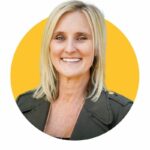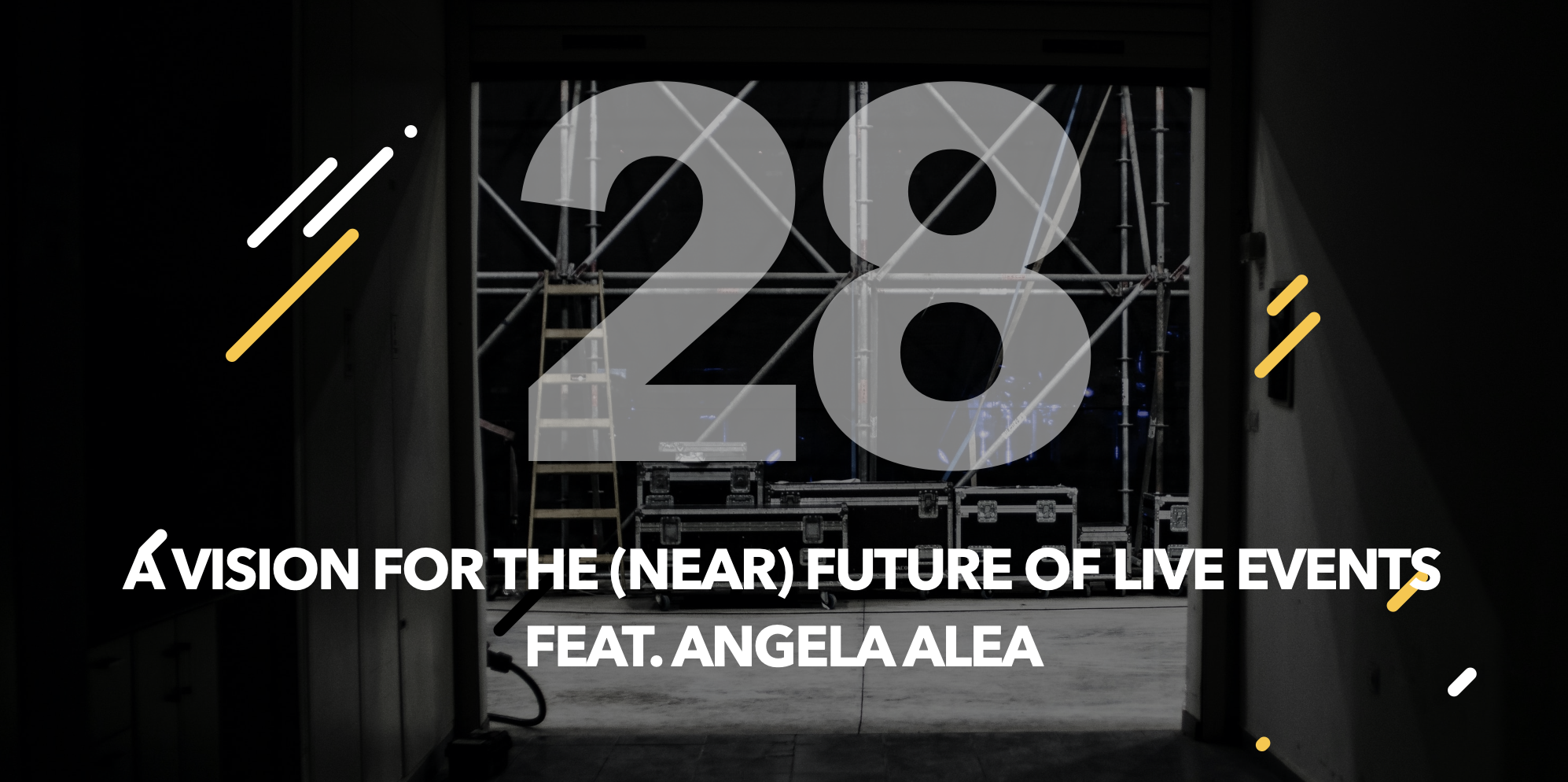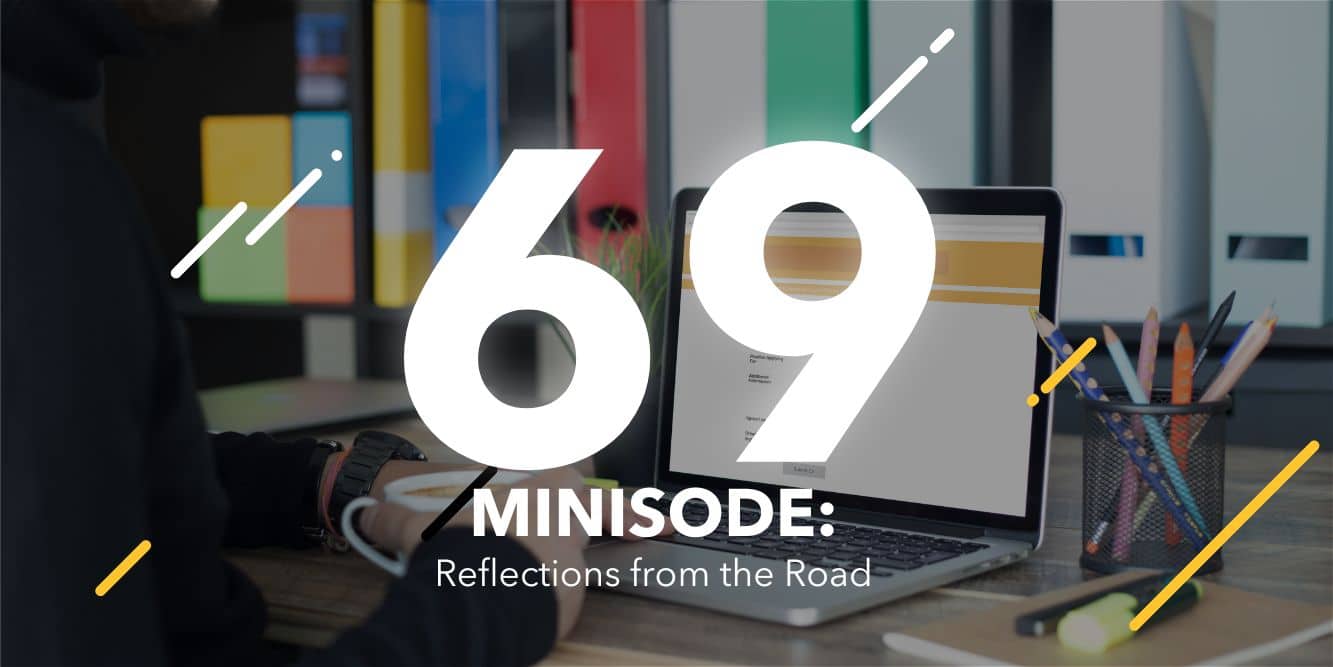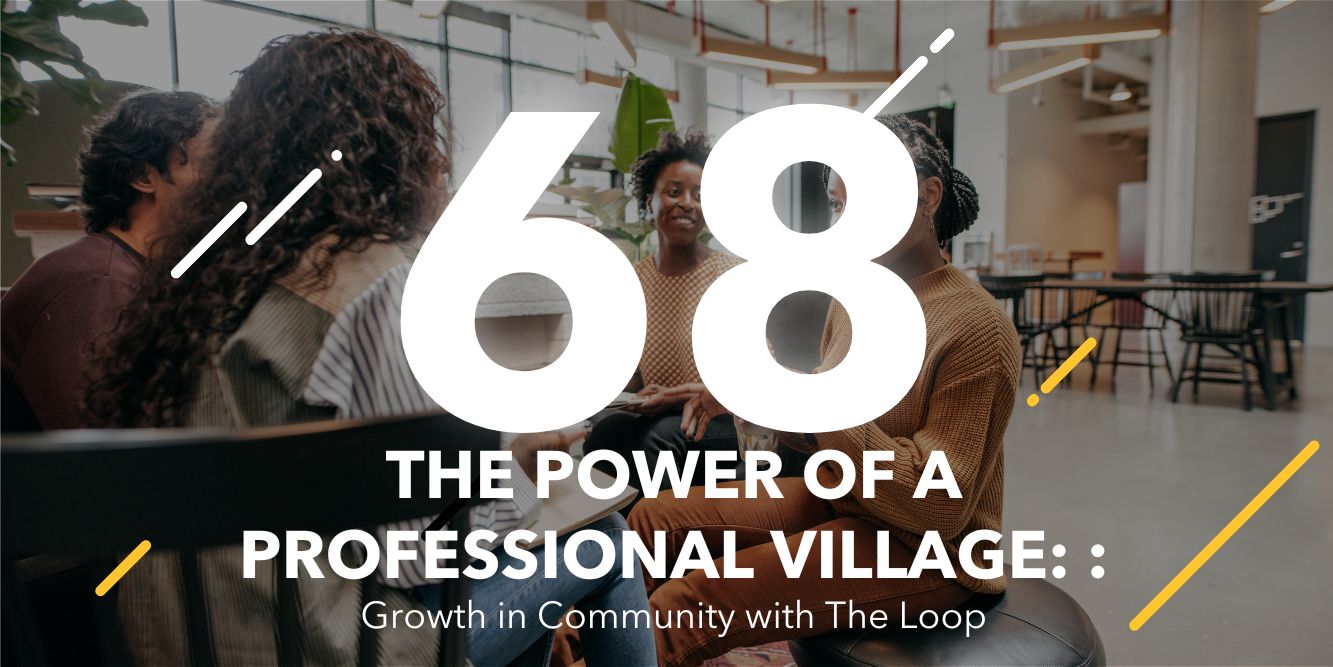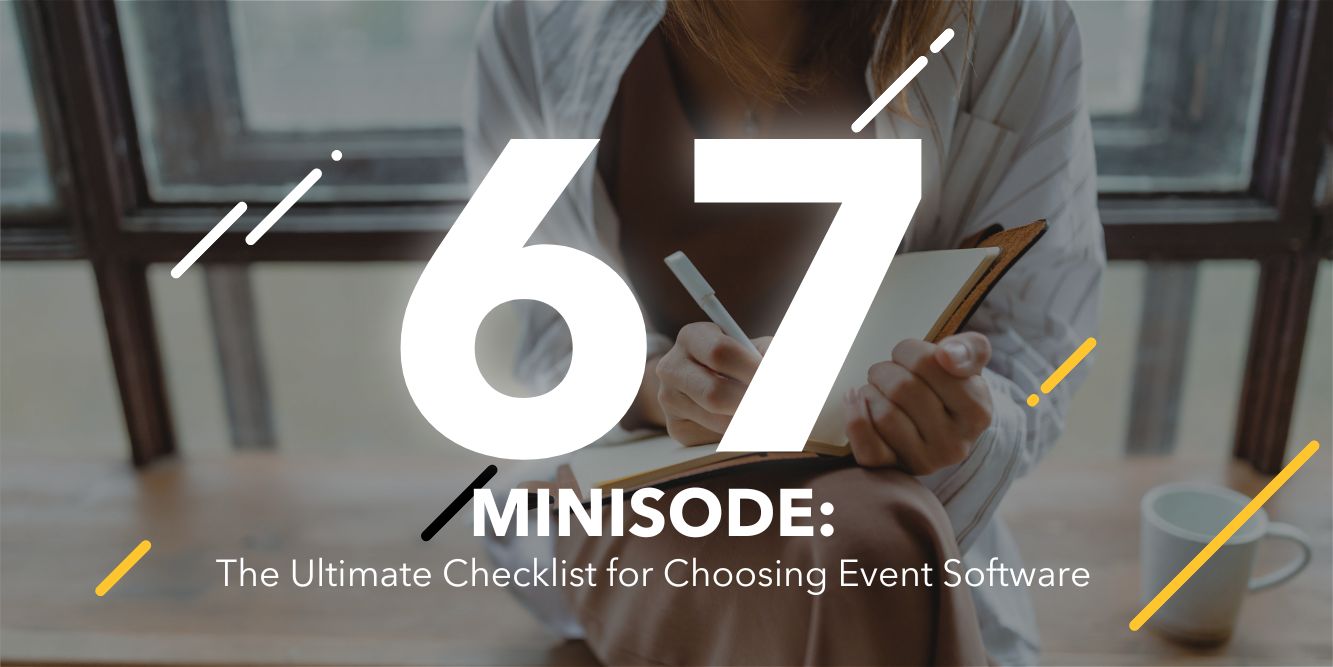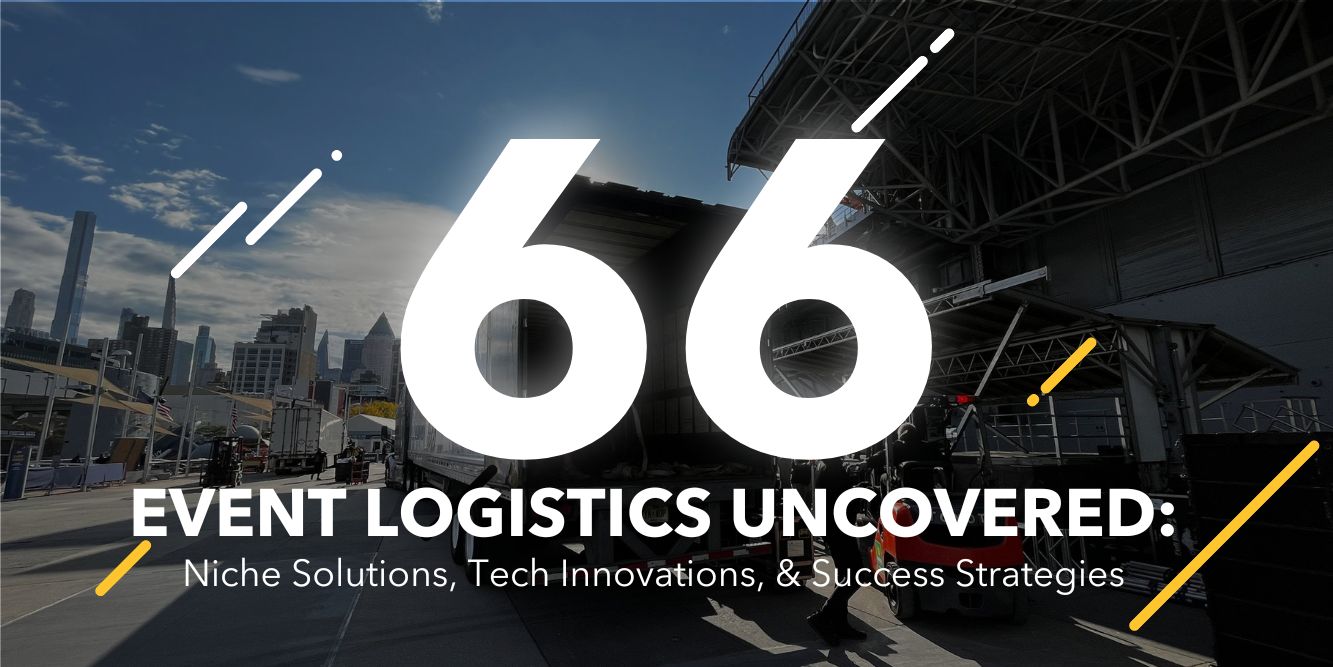What we’re talking about 💬
First: Background and Entry into the Industry
- Angela shares how she got into the live events industry.
- She explains how her interaction with the founder of a mid-size production company sparked her interest in the industry and its operations.
Second: Changes in the Industry Over the Last 10 Years
- Angela discusses how the live events industry has evolved over the last 10 years, from being gear-focused to being talent-focused.
- She highlights the need for the industry to adapt to the growing demands and improve processes to keep up with growth.
Third: A Passion for Compliance
- Angela talks about her passion for compliance in the live events industry.
- She explains why it’s important to do things the right way, both for the people in the industry and the companies.
Fourth: Lack of visibility and understanding of the live events industry
- The live events industry is fragmented with different sub-industries having different standards and ways of operating.
- There is a lack of a community that pulls everyone together and there is a need for more transparency and trust.
- The hope for the industry is to do more evangelizing, educate and inform people about the industry, and simplify things that are unnecessarily complicated.
Listen 🎧
Watch 📺
Read the Transcript 📚
Jess Cook: Hello and welcome back to another episode of Coring the Chaos. I am your guest host today, Jess Cook, and I am head of content here at Lasso and Angela is actually here with us today. But she’s our guest on the show and we’re really excited to have you on the other side today.
Angela Alea: Thanks for having me.
Jess Cook: Absolutely. We have Angela here today because what we really are looking to talk about [00:01:00] is a vision, a new vision for the very near future of live events and event production. And I have a handful of questions here. We’re gonna dig deep into what’s in the future. Like what’s ahead of us.
Jess Cook: It’s really exciting. I think we’re on the o other side of a very historic period of time for live events and we’re like rearing to go. So wanna talk about that with you today.
Angela Alea: Great. You’re right. I think our whole industry, we are rearing to go, especially after what we’ve been through.
Angela Alea: I think there’s a lot of great things on the horizon, so thanks for having.
Jess Cook: Absolutely. Thanks for having me. . . First I wanna give some folks some context, some background. I would love to know how you got into the live events
Angela Alea: industry. Yeah, absolutely. First of all, I never saw it coming. Uh, I didn’t set out and say, Hey, I’ve always wanted to be in the live events industry.
Angela Alea: But it just happened. So my background, I’ve always been in kind of revenue producing roles. Prior to lasso I spent about a decade in workforce management technology. [00:02:00] And at the time one of my clients was Sifford and he was the founder and owner of a mid-size production company in n.
Angela Alea: And just the more I got to know him, his business, learned about the industry it was a really interesting time when things were really beginning to change for our industry. No one at the time was W2 and of, cuz of course our industry. We’ve always done it this way, right?
Angela Alea: Everyone’s always freelanced. And then, with different regulations coming out, there were some compliance things on the horizon and he was just explaining to me their workflow and how they do shows and how they crew them, and, It was really fascinating to me. I really didn’t believe that an entire industry operated that way.
Angela Alea: I’ve typically been a consumer of these amazing events and concerts and N F L games and, we just take for granted that they just happen, really not having any idea as a consumer. all that goes into these things, and when he started to share with me how these [00:03:00] events are really produced and executed and all of the manual processes, it really blew my mind.
Angela Alea: He’s no. It’s not just my company. The whole industry operates that way. And I’m like, there’s no way an entire industry operates this way and is able to pull off these epic experiences and. , sure enough that it was true. And he had a vision to, to solve it for the industry and to give them good tools.
Angela Alea: And I’ve been fortunate enough to be along for the ride. And so that’s how I got started in live events.
Jess Cook: That’s amazing. What do you think looking back at that point in time, when you first really met Clay up until now, what has changed in the. Have we gotten a any less manual?
Angela Alea: Yes, we have.
Angela Alea: A absolutely. There’s a lot that’s different. I think people are more open to doing things differently. I think people are beginning to think less commodity, more value. 10 years ago people were all about the gear. The gear and the [00:04:00] people were an afterthought. I think people refer to.
Angela Alea: The great people who make things happen more as talent, less as labor, right? People place a different emphasis on the great people in the industry and I think people are forced to look for better ways to doing things cuz our industry is just continuing to grow and you can’t scale and grow. With manual processes.
Angela Alea: So I think people are eager to look for ways to improve. So yeah, I think we’ve changed a lot in the last 10 years and a lot of great ways. . That’s great.
Jess Cook: Reassuring for sure. Yes. I know a lot of loyal listeners will probably know that you are very passionate about compliance, and I just wanna talk a little bit about like, why is that, what makes that so personally important for
Angela Alea: you?
Angela Alea: Yeah, and look I’m agnostic when it comes. I can, whatever these companies wanna do that’s their decision. But what I have learned is you can’t outrun, you can’t outsmart, you can’t out finagle [00:05:00] compliance. It does catch up with you, right? You either pay for it now or you pay for it later.
Angela Alea: And I think at the end of the day, doing what’s right by people is important. . And I think doing things the wrong way can have some significant penalties, financial penalties reputation penalties, right? Your brand could suffer by not doing things the right way or cutting corners. And that’s not just 10 99 versus w2.
Angela Alea: That could be safety initiatives, cutting corners, right? It’s just doing what’s right and. I guess I have a heart for that, number one, cuz I know it’s not changing. And number two, I think, sometimes you gotta do the hard things to, to get to a better place. And I think when it makes the lives of the people who make these great experiences happen, when it makes their lives better, I just think it’s a good thing.
Angela Alea: And the reality is it’s not going away. So it’s like the sooner we figure out how to run our businesses in a more compliant manner, the better off we’re gonna be and the better we can compete. [00:06:00] And . That’s why, just because I know it’s not going away. Yeah. So we might as well embrace it. We don’t have to like it.
Angela Alea: No one likes it, right? No one’s Hey, yeah, let’s go do this just because we want to, it’s just not gonna go away. So we might as well just get on board with it, get on the, figure out the right way to do it. That’s right. Yeah,
Jess Cook: absolutely. All right, you’re, you and Clay partners we’re bringing this like great software to the industry, solving problems for them.
Jess Cook: Tell me a little bit about what that means to you. What does it mean to be able to bring these kinds of solutions these products and these features and knowing what you know about the industry and how it’s grown and changed. What does that mean to you to be able to do that?
Angela Alea: Yeah.
Angela Alea: To me it’s not about the features, the benefits. It looks great. It’s about the impact. How does it change lives? It increases the value. of your business. If you are doing things more efficiently, if you have things in place that allow you to capture more business at a higher profit margin, recruit great [00:07:00] talent to represent you and your brand at show site.
Angela Alea: Those are all things that add value. To your business. And in the meantime, it also changes lives. It changes the lives of the people that are working for you, with you around you, your clients, giving everybody a better experience, which let’s face it, that’s what everybody in live events is about. They’re about the show, the experience the magical performance, how it makes people feel.
Angela Alea: That’s why people pour their lives into this industry. And so as much as we wanna do that for the audience, . We have to do that for our people, for our employees, the ones who are making these experiences happen. And so it’s not about, bringing great features and things like that. It’s the impact that has on these businesses and the people who pour their lives into those businesses every day too.
Angela Alea: Yeah. .
Jess Cook: That’s great. I’m gonna read you some statistics from a recent survey we did, and then I just wanna hear your reaction to them. So this is all kind of information that we’ve learned from our customers and [00:08:00] talking to them in working with them pretty closely.
Jess Cook: Event production companies at the moment are using on average 2.8 tools to manage their project. one in four of them are using four or more tools. 40% of them are still managing their projects in spreadsheets. And 60% of event production companies said multiple sources of truth was their top project management event management problem.
Jess Cook: So I know we talked a little bit about like the industry’s come so far in 10 years. , not doing all these manual things anymore. But even with the advent of like software that’s meant to. , there’s still some pretty some pretty big issues, so I just wanna hear your thoughts on those that data there.
Angela Alea: Yeah. The first three that you read to me that the word that resonates with me is that’s painful, right? That’s a lot of places to go to do a job, and it should not be that complicated, that should not [00:09:00] be. Our industry needs something that speaks their. is a hub to do all of their work is simple, allows for collaboration and communication.
Angela Alea: So to me that’s painful. That fourth one that, that you read. Having multiple sources of truth, like to me, I think panic, . If I’m working on a show and I don’t know if I’m operating with the right information, to me that’s scary, right? Cuz there’s a thousand different places where a mishap could happen and many times the audience doesn’t.
Angela Alea: but you know it, right? If you’re on site, you know when that mess hep happens. And so to me that’s God just, I don’t know, brings out a little bit of anxiety, not knowing am I working with the right information? Is this the source of truth? So painful and scarier? I guess the words that kind of resonate with me and unnecessary, it shouldn’t be like that.
Angela Alea: Yeah.
Jess Cook: What do you think is how can we fix that? How
Angela Alea: can we change that? Not settle. Obviously lasa, right? We aspire to continue to bring great things to the industry, but there are so many creative [00:10:00] people in the industry and it’s amazing when we get to, to sit down with some of these companies and understand.
Angela Alea: all the workarounds that they’ve created it, it’s pretty incredible, and just their commitment to getting it right despite all those obstacles is big. So I think that’s part of it, right? Is hey, at the end of the day, I don’t care how difficult this is gonna be. Our experience that we give to our customers not gonna suffer.
Angela Alea: I don’t care if we have to work out of four tools, if that’s what it takes, we’re gonna do it. It’s expensive to do it and it’s not ideal, but at the end of the day, we’re gonna have a successful outcome. But I think. , we should not settle. We’ve gotta keep at it as an industry to to just continue to bring good tools to the industry so they can, it makes their jobs easier.
Jess Cook: Okay. I have two, two questions for you. Next, flip side of a coin, both of them. If live event companies can embrace one thing this year to improve their business, what in your mind would that be?
Angela Alea: Evolution? We’re evolving, we’re doing so quickly. Very quickly, there’s the haves and the havenots, [00:11:00] those that are doing and running versus those that are waiting.
Angela Alea: I think about leaders and followers. So I think embracing change leadership the pursuit of excellence, don’t wait. For things to happen. Go make them happen. Go. If you see a better way, you wanna build a better mousetrap, go do it. Our industry needs more of that. We need more thought letter, thought leadership, and more pioneers to help us to continue to evolve.
Angela Alea: Cause I think we’ve got so much ahead of us. And so evolution is what comes to my mind. On the
Jess Cook: flip side of that, if there was one thing that would hold a company back this year, what
Angela Alea: might that be? Not being prepared. , and I think it’s so easy to be tactical and in the weeds. There’s a lot of shows happening and execution.
Angela Alea: But how do we leapfrog that and get ahead of it, especially with resources being so scarce, whether it’s gear, people, whatever it is. And how do we get strategic and [00:12:00] thinking ahead of those things to prepare. So when an influx happens, you don’t have to say no. And don’t get me wrong, I I do think it’s important to say no to some things, but what’s painful is when you have to say no to that perfect piece of business that you’ve been pursuing because you just simply can’t do it.
Angela Alea: You don’t have the process, you don’t have the resources in place to be able to say yes at scale. So I think. Being prepared, not thinking ahead, not putting those things in place before you need them. I think that can hold us back.
Jess Cook: Looking ahead maybe this year, even beyond the event industry is re really complex.
Jess Cook: Tons of mo moving pieces, tons of people tons of planning and dependencies and like things that can go wrong at the exact moment that you really do not want it to go wrong. . How do we fix that? How do we find ways to uncomplicate the things that are unnecessarily complicated in this line
Angela Alea: of work?
Angela Alea: My dream is [00:13:00] for our industry to just standardize some things. Things become complicated when there is no standard. There is. Expectation, no normalcy, no standard things across companies, which is really hard when our industry is full of freelancers who work for multiple companies. It’s really frustrating for them.
Angela Alea: I work for Company A. They use these tools. This is what they call their positions. This is how they pay me. . I go to company B, I’ve gotta learn a completely different workflow, completely different tools. I’m paid differently. They’re calling my position something different. Or they’re calling it the same thing, but they have a different level of expectation that’s just not necessary.
Angela Alea: That’s just over complicating. Thing. So I think. Just standardizing even what we call things, position names how we pay people varies greatly. One of lassos most downloaded piece of content is our pay rate survey. And many of you have reached out this year to say, Hey, where is it? We didn’t do it because the data, there [00:14:00] is nothing standard about it.
Angela Alea: Across positions, across geography, across touring versus corporate versus festival, , all over the place. And so that’s to be expected, right? With all the turmoil and things that have happened over the last couple years. Good news is we’re seeing that start to stabilize. So you will be, you w we are gonna be sending that out again.
Angela Alea: But, even just, how companies are classifying people not having a good recruitment strategy for our industry. So those are things that I think we just need to get focused and all get on the same page. . I think that will just help minimize a lot of the complexities and confusion that happens, especially with all the new people coming into our industry, right?
Angela Alea: We wanna make it easy for them. We don’t wanna have a lot of friction. And so I think the more we can simplify those things, I think it’ll be helpful.
Jess Cook: You touched on this a bit earlier and I think this is related to, this kind of idea of standardization. Part of that is h changing how we talk about this industry, right?
Jess Cook: Like we don’t really do a very good job of like how we name things, how we talk about things. I’d love to hear your thoughts in on that a bit. [00:15:00] Maybe that’s part of standard standardization. Maybe it’s something bigger.
Angela Alea: You mean as far as how we talk about things? Yeah. Yeah. I think. In a lot of ways we talk around a lot of the same things, but we never really land on this is how it is in our industry.
Angela Alea: I think there’s, I don’t think our industry’s done a good job of let me rephrase that. We’ve done too good of a job staying behind the curtain, and I think it’s time we start to inform, educate. on what we do, how we do it. Our industry is the only industry that doesn’t even have our own s i c code, which is how you’re categorized as a business for insurances, for revenue, for all sorts of data that’s out there.
Angela Alea: Which is a whole other thing. There is no data on our industry. . We don’t have a lot of investment dollars. We’ve just done a really good job staying under the radar and behind the curtain. And I think for our industry to continue to evolve and to continue to progress, we gotta [00:16:00] tell people, Hey, even consumers, investors, the markets, everybody, here’s what’s actually happening behind the curtain.
Angela Alea: It was interesting. I was trying to. We’re bringing on a ton of people at Lasso, and many are from within the industry, and then some are not. And so now I’m trying to figure out like, how do we best educate these people on the industry? And so I’m looking feverishly online on YouTube. Like surely somebody has done a documentary, a video, something on all that happens.
Angela Alea: I cannot find a single one. If any of you know of it, please let me know. But that’s crazy with all the content out there, there’s not a single video. that teaches people from outside the industry how cool our industry is and what goes into a production. That talk about an opportunity. There, there’s so many different ways that we could educate.
Angela Alea: So I think that’s just it’s a really big opportunity for
Jess Cook: us. Absolutely. I know some of my kind of experience in the past was doing kind of the creative end of live events and when I actually got to go like on site and see. , [00:17:00] oh, my idea coming to life and how many people that takes and how much time that takes and all of the, just planning and everything around it is mind boggling.
Jess Cook: And so it really surprises me, yeah, that there’s just nothing out there that you can see that that world. . Yeah. That’s fascinating. Maybe we need, maybe that’s on us. Maybe we need to create that documentary.
Angela Alea: Maybe So any customers out there or companies that wanna help us with that, we would love to partner with you on that.
Angela Alea: Absolutely. That would be amazing. Yeah, it’s a great recruitment tool too, right? We wanna start to, educate people that are coming outta college or people that are looking for a different path. What better way to do that than to tell a story through, through that. So I think, I just think it’s a good opportunity for us.
Angela Alea: There,
Jess Cook: there seems to be, besides just a lack of line of sight into what this industry does and what we’re all about. A lack of like data as well, like you said, like the pay rate data is all over the board and it’s very hard to find a good focused single point of truth for that information.
Jess Cook: [00:18:00] How can we address this? Like how can we help companies have better data so they can make better business decisions so they know how to move forward?
Angela Alea: Yeah I think. . I think there’s a lot of small nuances in our industry, right? So touring is very different than corporate events. Corporate events is very different than festivals, right?
Angela Alea: So what is true in touring is not true in corporate events, right? But that’s okay. But at least if we start with that, right? What does standardization and touring mean? What does standardization in corporate events mean? What does standardization in theater mean? So I think even just starting there, because I think that does lead to a lot of the fragmentation that exists.
Angela Alea: And then the other thing is I don’t think there’s a lot of or there really isn’t a community that really pulls everyone together to share those things as well and talk the same speak. I will say, however, I love the peer groups that are done well, like the folks over at E P M. I think that group, it’s full of.
Angela Alea: [00:19:00] Pioneers, smart, strategic business owners, and that group has full transparency and trust with one another. Which, I think our industry, we hold things close to the vest and I would love to see us just open that up, not be so skeptical because we’re gonna have to work together to of create this.
Angela Alea: Community and the standard ways of operating and standard ways of talking and communicating and paying and all of that. So I think just building some of those communities within our industry could also be really helpful.
Jess Cook: 100%. And one last question for you, and this is something you always like to ask your guests, so I wanted to ask you.
Jess Cook: what is it that you hope
Angela Alea: for this industry? There’s a lot that I hope for. There’s a lot that I’ve hoped for 10 years ago that have already come to fruition. And but if I had to narrow it down, I would say our hope, our industry does more evangelizing. Showing people like brag don’t be behind the curtain.
Angela Alea: Evangelize more, educate more, [00:20:00] inform more on what goes into it. And then beyond that, work hard to simplify things. It doesn’t have to be that hard and I think that we all just have to commit to. Some things should be complicated and they are just by nature of what everyone does, and that is always going to be true.
Angela Alea: but let’s be intentional about simplifying the things that we over complicate, and that takes all of us doing that together. And I think out of that standardization will of come as a result of that. So that’s what I hope for our industry and I’m already seeing a lot of that, so that’s exciting to me.
Jess Cook: Thank you Angela so much. Thank you for letting me turn the tables today. That was really, Thank you for joining us on another episode of Corralling the Chaos. If you enjoyed this conversation please subscribe, follow along. If you have any questions, we are here to answer them.
Jess Cook: You can reach out to us@podcastlasso.io
